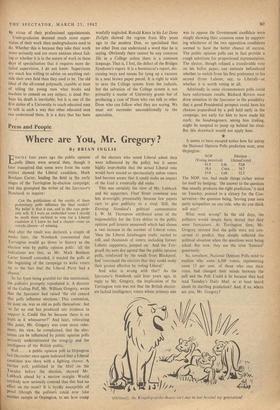Press and People
Where are You, Mr. Gregory?
By BRIAN INGLIS FxAcTLY four years ago the public opinion polls (there were several then, though it later transpired that some were from the same stable) showed the Liberal candidate, Mark Bonham Carter, leading the field in the early stages of the Torrington by-election campaign; and this prompted the writer of the Spectator's Notebook to inquire: Can the publication of the results of these preliminary polls influence the final verdict? My belief is that it can, and in this case prob- ably will. If I were an undecided voter I should be much more inclined to vote for a Liberal candidate if I knew he had a chance—even an outside chance--of winning.
And after the result was declared, a couple of weeks later, the Notebook commented that Torrington would go down to history as the election won by public opinion polls: 'all the indications are that, as Mr. Mark Bonham Carter himself conceded, it needed the polls at the beginning of the campaign to wake voters up to the fact that the Liberal Party had a chance.'
So far from being grateful for this testimonial, the pollsters promptly repudiated it. A director of the Gallup Poll, Mr. William Gregory, wrote that the Spectator had raised 'the old canard that polls influence elections.' This contention, he went on, was as old as polls themselves: but 'so far no one has produced any evidence to support it. Could this be because there is no truth in it whatsoever?' And later, reiterating this point, Mr. Gregory was even more vehe- ment; the view, he complained, that the elec- torate can be influenced by public opinion polls seriously underestimated the integri%y and the intelligence of the British public.
Well . . a public opinion poll in Orpington last December once again indicated that a Liberal candidate was there with a fighting chance. A further poll, published in the Mail on thb Tuesday before the election, showed Mr. Lubbock ahead by a narrow margin. Would anybody now seriously contend that this had no effect on the issue? It is hardly susceptible of proof (though the pollsters could now take another sample at Orpington, to see how many of the electors who voted Liberal admit they were influenced by the polls); but it seems highly improbable that the actual Liberal vote would have soared so spectacularly unless voters had become aware that it could make an impact of the kind it eventually did make.
This was certainly the view of Mr. Lubbock and his supporters. Fleet Street comment was less downright, presumably because few papers care to give publicity to a rival. Still, the Evening Standard's political commentator J. W. M. Thompson attributed some of the responsibility for the Tory defeat to the public opinion poll (source unnamed) which had shown a vast increase in the number of Liberal votes; 'then the Liberal bandwagon really started to roll, and thousands of voters, including former Labour supporters, jumped on.' And the Tele- graph the next day agreed that the public opinion polls, reinforced by the result from Blackpool, had 'convinced the electors that they could make their protest effective by voting Liberal.'
And what is wrong with that? As the Spectator's Notebook said four years ago, in reply to Mr. Gregory, the implication of the Torrington vote was not that the British elector- ate lacked intelligence; voters whose primary aim was to oppose the Government candidate were simply showing their common sense by support- ing whichever of the two opposition candidates seemed to have the better chance of success. The public opinion polls can in fact provide a rough substitute for proportional representation. The elector, though refused a transferable vote on his ballot paper, can estimate beforehand whether to switch from his first preference to his second (from Labour, say, to Liberal)—or whether it is worth voting at all.
Admittedly in some circumstances polls could have unfortunate results. Richard Rovere once drew attention in the Spectator to the possibility that a good Presidential prospect could have his chances jeopardised by a poll held early in the campaign, too early for him to have made his mark; the bandwagoners, seeing him trailing, might be tempted to jump up behind his rival. But this drawback would not apply here.
It seems to have escaped notice how far astray the National Opinion Polls prediction went, over Orpington :
NOP Election (Voting intention) (Actual vote)
41.8 .. Lib. .. 53.0 38.4 .. Cons. .. 34.7 19.8 .. Lab. .. 12.3 The NOP, too, had made things rather worse for itself by hedging: 'the answer to the question that usually produces the right prediction,' it said on Tuesday, pointed to a victory for the Con- servative—the question being, 'leaving your own party sympathies on one side, who do you think will win?'
What went wrong? In the old days, the pollsters would simply have denied that they were forecasters. At Torrington time, Mr. Gregory insisted that the polls were not con- cerned to predict; they simply reflected the political situation when the questions were being asked. But now, they use the term 'forecast' generously.
So, somehow, National ()pinion Polls need to explain why some 6,500 voters, representing some 15 per cent. of those who cast their votes, had changed their minds between the poll and the Poll. Could it be because they had read Tuesday's Daily Mail, or at least heard about its startling prediction? And, if so, where are you, Mr. Gregory?
'Obviously, the Kingship-of-the-Beasts isn't due to last beyond my generation!'


































 Previous page
Previous page